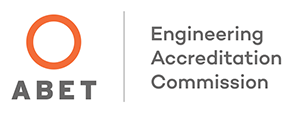Program Accreditation – Mechanical Engineering
Bachelor of Science (B.S.) Degree in Mechanical Engineering
The Mechanical Engineering program is accredited by the Engineering Accreditation Commission (EAC) of ABET, under the commission’s General Criteria and Program Criteria for Mechanical Engineering. This program leads to a Bachelor of Science degree in Mechanical Engineering.
Program Data
Enrollment – MEE (Mechanical Engineering)
Mechanical Engineering – Fall Enrollment
| Program | Degree | Fall 2020 | Fall 2021 | Fall 2022 | Fall 2023 | Fall 2024 |
|---|---|---|---|---|---|---|
| Composite Materials & Structures | Certificate | – | 1 | 1 | 2 | 1 |
| Composite Materials & Structures | Post-Baccalaureate Cert. | – | 3 | 6 | 4 | 4 |
| Interdisciplinary Studies (Multidisciplinary) | Doctorate | – | – | – | – | 1 |
| Mechanical Engineering | Bachelor’s | 463 | 481 | 431 | 444 | 501 |
| Mechanical Engineering | Master’s | 30 | 33 | 30 | 39 | 36 |
| Professional Science Master’s (Multidisciplinary) | Master’s | 4 | 5 | 5 | 4 | 3 |
| Mechanical Engineering | Doctorate | 20 | 23 | 23 | 22 | 22 |
Academic Unit Totals
| Degree | Fall 2020 | Fall 2021 | Fall 2022 | Fall 2023 | Fall 2024 |
|---|---|---|---|---|---|
| Bachelor’s | 463 | 481 | 431 | 444 | 501 |
| Master’s | 34 | 38 | 35 | 43 | 39 |
| Doctorate | 20 | 23 | 23 | 22 | 23 |
| Certificate | – | 1 | 1 | 2 | 1 |
| Post-Baccalaureate Cert. | – | 3 | 6 | 4 | 4 |
| Total | 517 | 546 | 496 | 515 | 568 |
Degrees Awarded – MEE
Mechanical Engineering
| Program | Degree | 2020–21 | 2021–22 | 2022–23 | 2023–24 | 2024–25 |
|---|---|---|---|---|---|---|
| Composite Materials & Structures | Certificate | – | – | – | 1 | – |
| Composite Materials & Structures | Post-Baccalaureate Cert. | – | 1 | 7 | – | 2 |
| Mechanical Engineering | Bachelor’s | 73 | 111 | 80 | 92 | 105 |
| Mechanical Engineering | Master’s | 6 | 11 | 14 | 14 | 16 |
| Professional Science Master’s (Multidisciplinary) | Master’s | 2 | – | 2 | – | 1 |
| Mechanical Engineering | Doctorate | 1 | 4 | 3 | 3 | 3 |
Academic Unit Totals
| Degree | 2020–21 | 2021–22 | 2022–23 | 2023–24 | 2024–25 |
|---|---|---|---|---|---|
| Bachelor’s | 73 | 111 | 80 | 92 | 105 |
| Master’s | 8 | 11 | 16 | 14 | 17 |
| Doctorate | 1 | 4 | 3 | 3 | 3 |
| Certificate | – | – | – | 1 | – |
| Post-Baccalaureate Cert. | – | 1 | 7 | – | 2 |
| Total | 82 | 127 | 106 | 110 | 127 |

